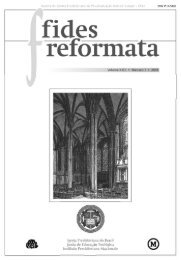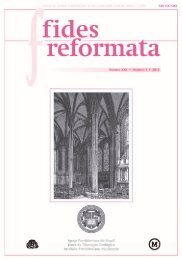Fides 22 N2
Um publicação do Centro Presbiteriano de Pós-graduação Andrew Jumper.
Um publicação do Centro Presbiteriano de Pós-graduação Andrew Jumper.
You also want an ePaper? Increase the reach of your titles
YUMPU automatically turns print PDFs into web optimized ePapers that Google loves.
FIDES REFORMATA XXII, Nº 2 (2017): 43-65<br />
ênfase presente na tradição reformada a partir de João Calvino e seu apreço pelo<br />
terceiro uso da lei como o “principal” –, mas ele trouxe à tona a importância<br />
da lei e de termos a lei sempre em vista para entendermos o evangelho. Não<br />
é que Lutero não enxergasse a lei como tendo de ser cumprida. Ele cria que<br />
ela seria cumprida pelos crentes no porvir. No entanto, nesta vida a palavra<br />
“lei” significava mais uma ferroada (por causa do segundo uso da lei) do que<br />
um deleite. Foi a tradição reformada que enfatizou a importância de encontrar<br />
deleite na lei do Senhor. Ainda assim, o fato de Lutero não descartar a lei como<br />
parte do processo redentor foi o pontapé inicial para uma visão “evangélica”<br />
da lei. Contudo, tal visão passaria por grande desenvolvimento pelo menos<br />
até o século 17 na Inglaterra e início do século 18 na Escócia, com a Marrow<br />
Controversy (Controvérsia da Medula).<br />
ABSTRACT<br />
After presenting the essential tenets of the Lutheran doctrine of justification<br />
in dialogue with interpreters of Martin Luther, this article introduces<br />
the Antinomian Controversy with Johann Agricola in which he questions if<br />
repentance was the result of the exposition of the law or the preaching of the<br />
gospel. The law/gospel hermeneutical structure is presented as the scenario<br />
for the debate, Agricola’s opposition to the teachings of Philip Melanchthon<br />
is summarized, followed by Luther’s response and the ratification of the Formula<br />
of Concord. The purpose in summarizing the Antinomian Controversy<br />
in Lutheran settings is to raise points of connection with Antinomianisms in<br />
seventeenth century England, when similar debates arose, and consequent<br />
lessons for today. This article argues that there is a need to tell this story again<br />
in order to meet certain needs in the evangelical scenario both in Brazil and<br />
abroad.<br />
KEYWORDS<br />
Martin Luther; Antinomian; Antinomianism; Johann Agricola; Justification;<br />
Law and gospel; Repentance.<br />
65




